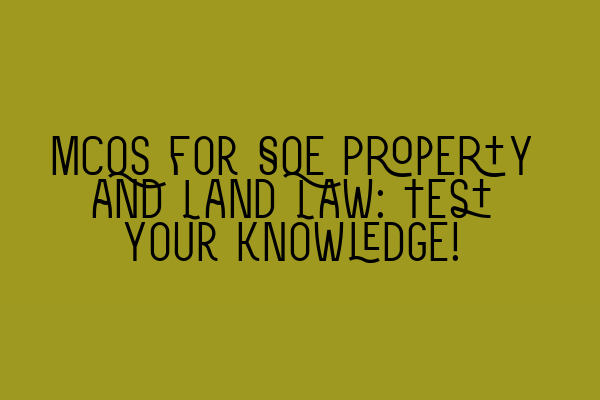MCQs for SQE Property and Land Law: Test your knowledge!
Are you preparing for the Solicitors Qualifying Examination (SQE) in Property and Land Law? Looking to assess your understanding and test your knowledge? You’ve come to the right place! In this informative blog post, we will provide you with a series of Multiple Choice Questions (MCQs) to help you evaluate your grasp of key concepts and principles in Property and Land Law. So, let’s dive in and put your knowledge to the test!
Question 1:
Which of the following forms of ownership grants individuals the absolute and exclusive rights to possess, use, and dispose of their property?
a) Tenancy in common
b) Leasehold
c) Freehold
d) Joint tenancy
Answer: c) Freehold
Explanation: A freehold ownership grants individuals the highest level of ownership interest in a property. It provides absolute and exclusive rights, allowing owners to possess, use, and dispose of their property as they please.
Question 2:
In a leasehold arrangement, who holds ownership of the property?
a) The landlord
b) The tenant
c) Both the landlord and tenant
d) The government
Answer: a) The landlord
Explanation: In a leasehold arrangement, the landlord retains ownership of the property while granting the tenant the right to occupy and use it for a specific period, as outlined in the lease agreement.
Question 3:
True or False: A joint tenancy includes the right of survivorship.
Answer: True
Explanation: A joint tenancy is a form of co-ownership where all tenants have an equal and undivided interest in the property. One key characteristic of a joint tenancy is the right of survivorship, which means that if one tenant dies, their interest automatically passes to the surviving joint tenants.
Question 4:
Which legal document is used to transfer ownership of property from one party to another?
a) Tenancy agreement
b) Lease agreement
c) Contract of sale
d) Trust deed
Answer: c) Contract of sale
Explanation: A contract of sale, also known as a purchase agreement, is a legally binding document used to transfer ownership of property from one party (seller) to another (buyer). It outlines the terms and conditions of the sale, including the purchase price, property description, and any contingencies.
Question 5:
What is adverse possession?
a) A legal principle allowing a trespasser to gain ownership rights over someone else’s property
b) An easement granted to a neighboring property owner
c) A form of joint tenancy
d) A mortgage default
Answer: a) A legal principle allowing a trespasser to gain ownership rights over someone else’s property
Explanation: Adverse possession is a legal concept that allows a trespasser to acquire ownership rights over someone else’s property under certain circumstances. To successfully claim adverse possession, the trespasser must occupy the property openly, continuously, and without the owner’s permission for a specified period, usually several years.
We hope you found these MCQs helpful in assessing your knowledge of Property and Land Law. By regularly testing your understanding, you can identify areas that may require further review and improve your overall preparation for the SQE examination.
Remember, mastering Property and Land Law requires a comprehensive understanding of various concepts, principles, and legal frameworks. Consider seeking additional resources, study materials, and professional guidance to enhance your preparation.
Stay tuned for more informative content related to SQE Property and Land Law from SQE Property Law & Land Law. Best of luck with your exam preparations!
Disclaimer: This blog post is for informational purposes only and should not substitute professional legal advice.
